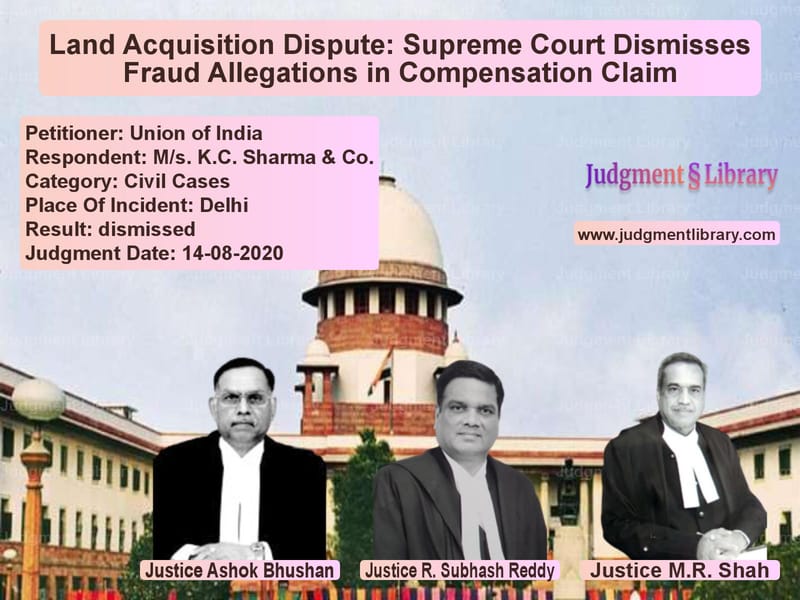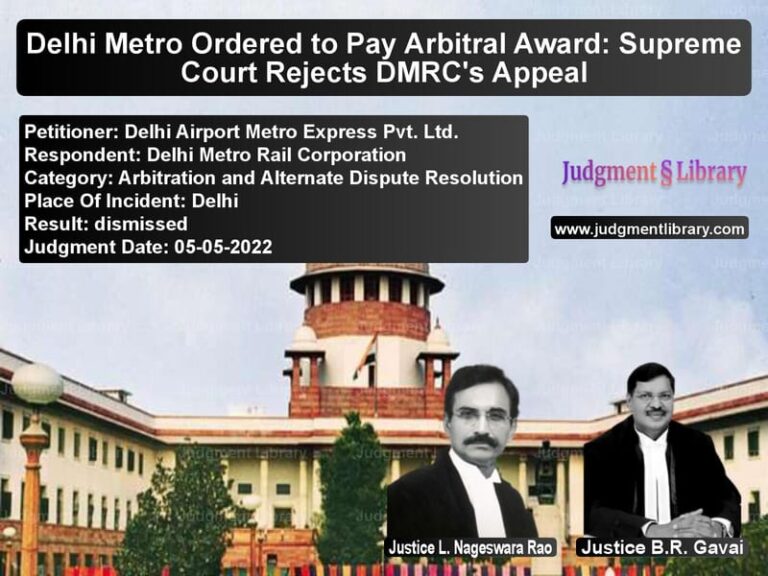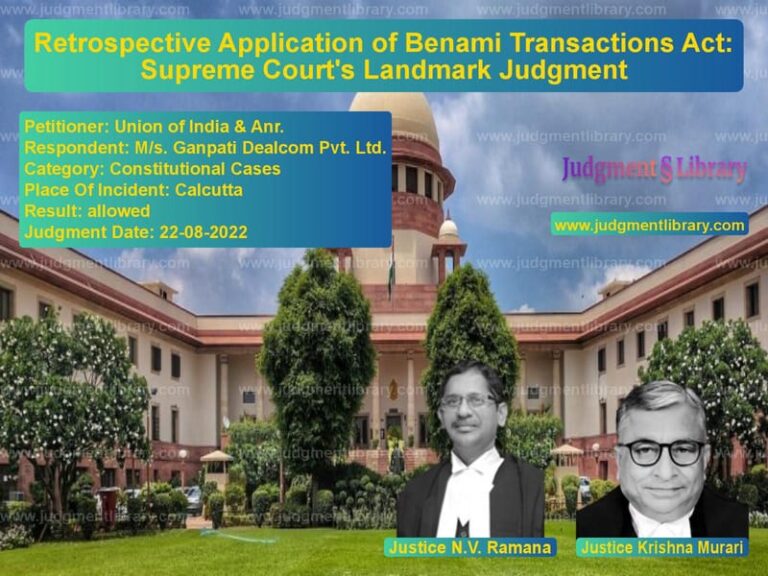Land Acquisition Dispute: Supreme Court Dismisses Fraud Allegations in Compensation Claim
The case between the Union of India and M/s. K.C. Sharma & Co. revolved around a long-standing land acquisition dispute concerning compensation awarded to the respondents. The Supreme Court examined whether the original judgment awarding compensation to the respondents was obtained through fraudulent means, as alleged by the government.
Background of the Case
The dispute originated from the acquisition of 36 bighas and 11 biswas of land in Luhar Heri, Delhi, under the Land Acquisition Act, 1894. The notification under Section 4(1) was issued on 27.01.1984, followed by a declaration under Section 6 on 20.09.1984. The government took possession of the land through Award No.101/86-87 on 19.09.1986.
The respondents, claiming to be lessees of the land under the Gaon Sabha, sought compensation, arguing that they had invested significant resources in making the land cultivable. The dispute was referred to the Civil Court under Sections 30 and 31 of the Land Acquisition Act. The Civil Court, in its judgment dated 28.09.1989, awarded 87% of the compensation to the respondents and the remaining 13% to the Gaon Sabha.
Challenges to the Compensation Award
Nearly three years later, villagers filed a writ petition alleging that the respondents were not genuine lessees and had colluded with the ex-Pradhan of the Gaon Sabha to fraudulently obtain compensation. The Delhi High Court permitted the Additional District Magistrate (ADM) to intervene in pending proceedings under Section 18 of the Land Acquisition Act.
Following this, the Union of India filed a suit in 2005 (Suit No.203 of 2005), seeking to nullify the compensation awarded to the respondents on grounds of fraud. The trial court ruled in favor of the government, declaring that the respondents had obtained compensation fraudulently.
Appeal Before the Delhi High Court
In response, the respondents challenged the trial court’s decision before the Delhi High Court. The High Court ruled in favor of the respondents, setting aside the trial court’s decision. It held that the government failed to establish fraud and that the respondents had legally obtained their lease.
Arguments by the Petitioner (Union of India)
- The government contended that no lease deed existed between the Gaon Sabha and the respondents.
- They argued that the respondents were merely allowed to remove ‘shora’ from the land to make it fit for cultivation and did not possess any tenancy rights.
- The judgment awarding compensation was allegedly obtained through collusion between the respondents and the ex-Pradhan of the Gaon Sabha.
- Since the original decree was obtained by fraud, it was null and void.
Arguments by the Respondents (M/s. K.C. Sharma & Co.)
- The respondents maintained that they were legally granted a lease through an auction process.
- The lease was approved by all Gaon Sabha members and sanctioned by the Deputy Director of Panchayat.
- They had been in possession of the land for over 30 years and had made significant improvements.
- Revenue records confirmed their continuous possession and cultivation of the land.
- They invoked Section 53A of the Transfer of Property Act, arguing that even if no formal lease deed was executed, they were entitled to protection as possessors.
Supreme Court’s Verdict
The Supreme Court upheld the Delhi High Court’s ruling, dismissing the government’s fraud allegations. Key observations included:
- The respondents’ lease was granted through an open auction, approved by the Deputy Director of Panchayat.
- There was no concrete evidence proving collusion between the respondents and the ex-Pradhan.
- Revenue records and other documents demonstrated the respondents’ long-term possession and cultivation.
- Fraud allegations require specific pleadings and proof, which the government failed to establish.
- The government’s suit challenging the compensation award came many years after the original judgment, without any appeal against the decree passed in 1989.
Final Judgment and Implications
The Supreme Court ruled that no case was made out to interfere with the High Court’s decision. It dismissed the appeal, affirming that the respondents were lawfully entitled to their compensation. This judgment highlights the principle that fraud must be conclusively proven and cannot be presumed based on vague allegations.
Petitioner Name: Union of India.Respondent Name: M/s. K.C. Sharma & Co..Judgment By: Justice Ashok Bhushan, Justice R. Subhash Reddy, Justice M.R. Shah.Place Of Incident: Delhi.Judgment Date: 14-08-2020.
Don’t miss out on the full details! Download the complete judgment in PDF format below and gain valuable insights instantly!
Download Judgment: Union of India vs Ms. K.C. Sharma & C Supreme Court of India Judgment Dated 14-08-2020.pdf
Direct Downlaod Judgment: Direct downlaod this Judgment
See all petitions in Property Disputes
See all petitions in Contract Disputes
See all petitions in Landlord-Tenant Disputes
See all petitions in Judgment by Ashok Bhushan
See all petitions in Judgment by R. Subhash Reddy
See all petitions in Judgment by Mukeshkumar Rasikbhai Shah
See all petitions in dismissed
See all petitions in supreme court of India judgments August 2020
See all petitions in 2020 judgments
See all posts in Civil Cases Category
See all allowed petitions in Civil Cases Category
See all Dismissed petitions in Civil Cases Category
See all partially allowed petitions in Civil Cases Category







